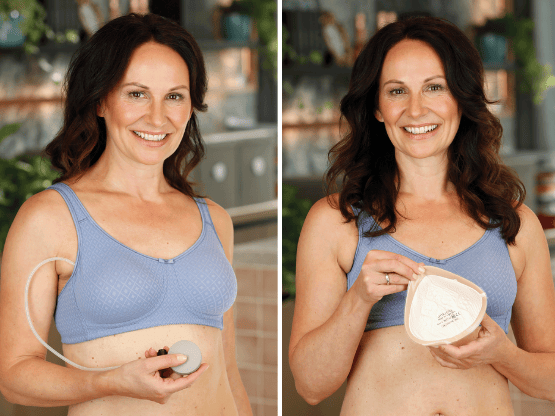Strong Breast Cancer Survivor
When Gaynor Smith was diagnosed with breast cancer, she thought it was a death sentence. Eighteen years later, she’s still here and proud to be a survivor.
Like so many women, Gaynor clearly remembers the day she was told she had breast cancer. “It was 29th June 2000, on my mum’s 80th birthday,” she says. “I had organised a party for her and the whole family was going to be there.” Gaynor had gone to her GP the week before because “something didn’t feel right – my nipple had become inverted. I’d had mastitis in the past, but this was different.”
Gaynor’s GP arranged an appointment for her at the local breast clinic. “I was seen on the Friday morning, and they did a biopsy and a mammogram, and said they would send the biopsy away for analysis. Deep down, I knew then.”
The following Friday, Gaynor went to the breast clinic at her local hospital and the consultant told her that she had stage three breast cancer. “He said I’d need chemotherapy, mastectomy and radiotherapy and that they planned to start the treatment on Monday. It all seemed so sudden – particularly with the party that weekend.”
Everything felt a bit surreal at her mother’s 80th celebrations. “I was on autopilot, I think. The party went OK. My husband took the diagnosis really badly – he went to pieces when we were with the consultant. I told my children on the day of the party – my son was 15 and my daughter was 20 and about to get engaged. I remember thinking ‘Will I be here for her wedding?’ Although I made it through the party, the following day I was sitting in the garden and my friend rang and said ‘Are you OK?’ It was then that I hit the wall.”
Events happened so fast after that fateful weekend that Gaynor didn’t have much time to over-think things. She started treatment with chemotherapy to shrink the tumour, and was determined to continue working throughout. “I asked if I could have reconstruction but unfortunately, because I had to start radiotherapy six weeks after surgery, I was told this wouldn’t be possible.”
At 43, that was difficult to come to terms with, but it wasn’t the worst aspect of her treatment. “The biggest thing about the chemo was losing my hair. It was awful. I used to be dark, but it came back silver.” Gaynor decided to go blonde, which was easier than trying to go back to her original brunette. “There was one good thing about the hair loss, though,” she remembers, “I didn’t have to shave my legs, so it was fantastic from that point of view.” She also remembers the funny side of hair loss – rubbing her pencilled eyebrows off by mistake, particularly when mopping her face during hot flushes.
Career girl
Gaynor doesn’t remember feeling particularly nervous about going into hospital for surgery: “I just wanted to get rid of the cancer,” she says. “It didn’t bother me that I was losing a breast, but I admit it was quite a shock when they took the bandage off. The shape wasn’t great because of the amount of tissue that had to be taken away, so I was left with a bit of a lump.”
Her surgery also included the removal of 29 lymph nodes. “I did suffer with lymphoedema initially and I wore a compression sleeve for a while. But I did everything I was told to do in terms of care and exercises, and the lymphoedema actually got better. They measured my arm at the beginning of the treatment and I was thrilled when they told me it had gone down. At first I couldn’t get both arms into my clothes, but then it went back to normal.”
A committed career woman, Gaynor was working for Lloyds Bank at the time of her diagnosis. “They were brilliant. I used to go in every day and do my work as normal, and I had some fantastic friends and colleagues there. I finished chemo just before Christmas, and it was only for the last fortnight that I felt I really couldn’t go into work.” She found radiotherapy easier than chemo, although having treatment after work was tiring.
Far from allowing cancer to adversely affecting her career, Gaynor even went for promotion during her treatment and moved to a call centre as resource manager, heading up two large customer care teams. It wasn’t always easy – particularly when she started Tamoxifen and went into an early menopause, which often meant 30 or 40 hot flushes a day.
Getting away
Gaynor’s antidote to the worries that breast cancer brings is to have something to focus on. Her career undoubtedly helped keep her going and took her mind off the treatment, but she and her husband absolutely love to travel, and she swears this has helped her to stay positive.
“I think you’ve got to live for today,” she says. “We love our holidays, and we planned to go to Florida in the September after my treatment had finished. We’ll never forget that trip because it coincided with 9/11 and we were evacuated from Universal Studios!
“We had also travelled to Jersey in the March of that year, just as my hair had started to grow back. I remember trying to wear my wig, although I absolutely hated it and ended up wearing head scarves whenever possible. I also remember looking in the mirror at that time and seeing someone vulnerable – no eyebrows or lashes. Your emotions are all over the place, but it does get better. Looking back, I realise it’s just a small window on your life. I told myself ‘I have to keep going’.”
Family affair
Gaynor’s sister, who is 15 years her senior, was diagnosed with breast cancer just two years after Gaynor, at the age of 62. “It was tough to watch her go through exactly what I went through, but I was glad I could be there to support her. We used to share wigs and even breast forms. And we definitely cheered ourselves up with plenty of retail therapy.”
She realised then just how difficult it must have been for her husband: “He is my rock,” she says. “I couldn’t have done it without him. Your emotions vary so much during treatment and afterwards. You are on a high one minute and a low the next, and sometimes it just gets to you. He was there to support me through everything.”
From wondering if she would live to see her daughter get married, Gaynor has been there for all her family’s milestones, big and small. “My daughter did get married and she now has two sons, one of whom is severely disabled. My son also recently got married and has a little boy. The boys keep us young!”
Believe in better days
Asked if breast cancer has affected her outlook on life, Gaynor says she tries to take things one day at a time. “I enjoy life – I love my holidays and my family. I am more conscious of my weight and what I eat. I’ve lost over a stone since my diagnosis.
“I have the same chance as anybody else on the street of getting cancer now. At the back of my mind there’s always a niggling thought that it might come back – you get the odd twinge and you think the worst. But I think it’s important to emphasise that more and more women are surviving breast cancer, and life goes on. We need more survivor stories. It gives women like me hope to read them.
“Somebody said to me staying positive doesn’t mean you have to be happy all the time – it means that on the hard days you know that there are better ones coming. And I think that’s so true. It’s difficult to tell someone newly diagnosed that it is going to get better. I am quite stubborn though, so I wasn’t going to let it win.
I do believe in positivity. Help yourself; enjoy life. There’s no point in worrying about what could be – you’ve just got to enjoy each day.








